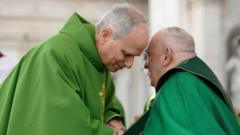Elected as the new pope, Robert Prevost is viewed as a unifying figure tasked with addressing splits within the Church and continuing the legacy of Pope Francis, focusing on social justice and building global ties.
New Pope Robert Prevost Emphasizes Unity and Continuity in His Leadership

New Pope Robert Prevost Emphasizes Unity and Continuity in His Leadership
Cardinal Robert Prevost, elected quickly at the conclave, aims to foster unity within the Catholic Church amidst global challenges.
Cardinal Robert Prevost's swift election as pope suggests a strong consensus among the voting cardinals regarding his capability to navigate the myriad challenges facing the Catholic Church. In the lead-up to his election, conversations among the cardinals frequently highlighted two pivotal concepts: "continuity" and "unity." There was a collective acknowledgment of Pope Francis' significant outreach to marginalized communities both within and outside the Catholic faith, alongside a need to reconcile the often-visible divisions within the Church's hierarchy, which tend to be classified as traditionalist versus progressive.
In this context, Prevost, a dual citizen of the US and Peru and a covert supporter of Pope Francis, emerged as a favorable candidate capable of bridging these factions. The cardinals charged with electing a new pope were tasked not only with reflecting the needs of the Catholic institution but also aligning with the broader humanitarian challenges exacerbated by global conflicts. Prevost was seen as apt to connect disparate communities, having established rapport equally with North American and Latin American peers.
Pope Francis faced criticism for struggling to build alliances in the US on critical matters such as migration, climate change, and socioeconomic inequality. In light of this, Prevost's election may signify a strategic shift, prioritizing the Church's mission to construct "bridges" and promote the notion of global unity, akin to Francis' vision.
In his inaugural address from St. Peter's balcony as Pope Leo XIV, Prevost emphasized themes of interconnectedness and collective responsibility. As he embarks on this journey, much scrutiny will fall upon his previous actions and views, including his handling of sensitive issues like abuse within the Church and sociopolitical concerns. However, it appears that the cardinals felt confident in his leadership capabilities and ethical standing, paving the way for a potentially impactful papacy.
Challenges loom large for Prevost, yet his rapid election signals a robust mandate from cardinal voters, positioning him to lead the Catholic Church while addressing both internal and external pressures.



















